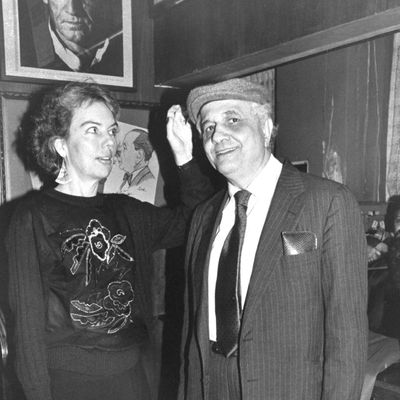
Andrew Sarris, a legendary American film critic, has died at the age of 83, ending a long career spent mostly at the Village Voice and the New York Observer — from which he was only recently (and, it must be said, prematurely) let go. Generations of Columbia University film students had the privilege of hearing Sarris ramble brilliantly on the works of our most over- and underrated directors in that beautiful baritone that broke high, like Ed Wynn at his most giggly, sometimes punctuated by showers of spittle. When he loved something, he could barely contain himself. And Sarris was a huge presence.
It has been impossible to be a critic since the 1968 publication of his The American Cinema without reckoning with Sarris’s work, which, at its best, combined the French penchant for logic and categorization with a spiky American iconoclasm. His lonely (among Americans) 1960 assessment of Psycho, widely dismissed back then as a tawdry potboiler, is justly celebrated. Taking his cue from Cahiers du Cinéma auteurist critics, Sarris drew a clean line from Alfred Hitchcock’s visual motifs to the director’s bleak worldview, which could oscillate in an instant between paranoia and complicity with the murderous voyeur:
“Such divergent American institutions as motherhood and motels will never seem quite the same again, and only Hitchcock could give a soft-spoken State Trooper the visually sinister overtones of a dehumanized machine patrolling a conformist society … In its treatment of outrageous perversion as a parody of an orderly social existence, Psycho has a certain affinity to a modern theatre piece like The Connection in which the audience is forced to respond to its own hypocrisy in making the conventional moral distinctions.”
Many of us had reservations about Sarris’s inclusion of some directors in his pantheon and dismissal of others, but he was often the first critic we turned to when confronting a particular filmmaker, finding penetrating insights in even his most packed and unwieldy sentences. Before Sarris, most American cinephiles didn’t know you could study the body of a director’s work that way, finding echoes and interconnections and themes that stretched back to the beginning of American literature.
Sarris often attacked more impressionistic and descriptive writing on film, although his work was more entertaining for the debates he routinely held with himself. Accused in the last three decades of resting on his status and quoting himself instead of doing fresh thinking, he was actually forever adjusting his judgments, shifting directors in and out of favor as he re-watched and rethought their work. What anchored his criticism — what made him rewarding to read even when you vigorously disagreed — was that he viewed The American Cinema as a work in progress.
Although we overlapped for several years at the Village Voice, I didn’t know him — I saw him at the office maybe three times. He never used a computer, his typewritten copy arriving via messenger, often at the last minute. (When editors once threatened to kill a column of his because it was late and the typesetters were busy, I divided the pages with my colleague J. Hoberman — a former student of Sarris’s — and we typed the piece into the computer system. Sarris was rightly unhappy I misspelled Katharine Hepburn’s name — but the thing ran!) In 2004, I invited him to join me, Hoberman, and fellow Voice alumna Manohla Dargis in a year-end Slate Movie Club, but was told he “wasn’t on the Internet.” What a joy it would have been to mix it up with him in this new medium.
Sarris had thin skin and loved a good fight — and he was smart enough to make sure the battles were good. But I have to take issue with the lazy idea that Sarris and Pauline Kael took shots at each other throughout their respective careers, or that, as the Times obituary puts it, Kael “delighted in lancing the auteurists as a wolf pack of nerdy and too-pale young men.” By my count, she did so once, in an essay 50 years ago attacking his first published case for the auteurist theory called “Circles and Squares, Joys and Sarris” — which Kael notably left out of her hand-picked anthology, For Keeps. In hiring Kael for The New Yorker, the magazine’s editor, William Shawn, insisted she write about the films and not attack other critics by name — and her work was the better for it. Sarris, meanwhile, took many occasions to lambaste her. The 2001 obituary he wrote for Kael was acidly titled “Farewell, My Lovely.”
There’s no reason you shouldn’t be able to thrill to the work of both Sarris and Kael, two of the defining voices of film’s first century. Indeed, I can’t imagine a month in which I won’t pull down The American Cinema from my shelf and hear Sarris’s breathless voice, scattering keys that will unlock the work of some of our greatest artists with grand and enviable exuberance.





